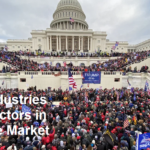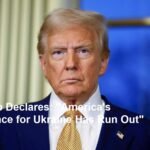International Monetary Fund (IMF) Managing Director Kristalina Georgieva has raised serious concerns over the recent U.S. tariff policy, describing the new measures as a “significant risk” to the global economic outlook. Speaking at a high-profile international economic forum, Georgieva emphasized the urgent need for Washington to engage in constructive dialogue with its trade partners to mitigate potential negative impacts on global growth.
The new U.S. tariffs, which have been implemented across a wide range of goods from multiple trading nations, mark a departure from previous trade policies that relied more on targeted measures. Instead, this sweeping approach has been widely interpreted as a signal of the U.S. government’s willingness to employ aggressive protectionist tactics in pursuit of domestic economic objectives. Georgieva noted that while nations have the sovereign right to protect their industries, the unilateral imposition of tariffs risks triggering a cycle of retaliatory measures that could undermine global economic stability.
“The new tariffs are not just a domestic policy tool; they have far-reaching implications for international trade and investment,” Georgieva remarked during her address. “They represent a significant risk to the global economic recovery, particularly at a time when our economies are still fragile from recent shocks.” Her comments come at a time when many countries are striving to balance post-pandemic recovery efforts with the uncertainties of an increasingly complex geopolitical landscape.
Economists and policy analysts have echoed the IMF chief’s warning, highlighting that the tariffs could disrupt established global supply chains and exacerbate inflationary pressures. A number of experts believe that if the U.S. continues on its current path, the resultant trade tensions may lead to a slowdown in global growth. In particular, emerging markets, which are heavily reliant on open trade policies, could see their export revenues decline as trading partners seek alternatives to U.S. markets.
Georgieva also stressed that the global economic system is more interconnected than ever before, making unilateral measures particularly dangerous. “When one major economy enacts broad tariff policies, it sends shockwaves through the entire network of global trade,” she explained. “The U.S. must realize that its actions affect not only its own economy but also those of its partners and, by extension, the entire international community.” This sentiment underscores a growing consensus among global leaders that economic challenges today require collaborative solutions rather than isolated, competitive measures.
The IMF chief’s call for cooperation is a reminder that multilateral dialogue remains essential in addressing contemporary economic issues. The U.S., with its significant influence over international finance and trade, has a responsibility to lead by example and work closely with other nations to ensure that any policy adjustments are coordinated and transparent. Such collaboration is critical to avoiding the kind of retaliatory cycles that have previously led to economic downturns and increased market volatility.
While some U.S. policymakers defend the tariffs as necessary steps to protect American jobs and reduce trade imbalances, critics argue that the long-term costs could far outweigh the short-term gains. “The risk is that in trying to correct domestic imbalances, we create a backlash that harms not only our trading partners but also our own economy,” one prominent economist stated. Georgieva’s remarks have resonated with many in the international community, who fear that a deterioration in global trade relations could derail the tentative progress made in recent years toward a more stable and predictable international economic order.
In conclusion, Kristalina Georgieva’s warning about the risks associated with the new U.S. tariffs serves as a stark reminder of the challenges facing a globalized economy. The emphasis on cooperation and dialogue is not just a diplomatic call to action; it is a pragmatic strategy to safeguard economic stability in an era marked by rapid change and uncertainty. As the world watches the unfolding developments, all eyes remain on Washington to see if it will heed the IMF chief’s advice and work collaboratively with its trade partners for the benefit of the global community.












